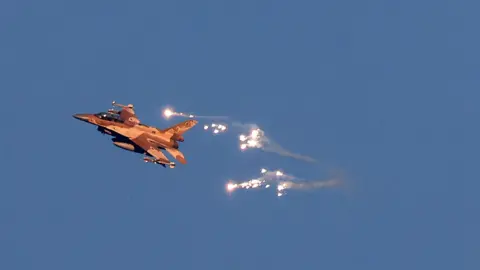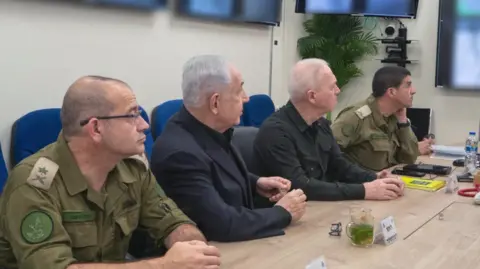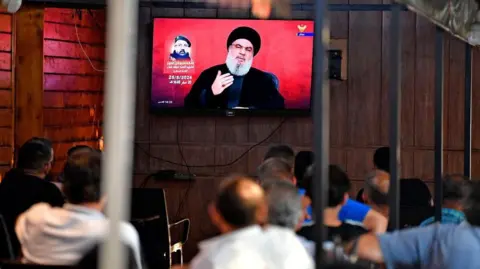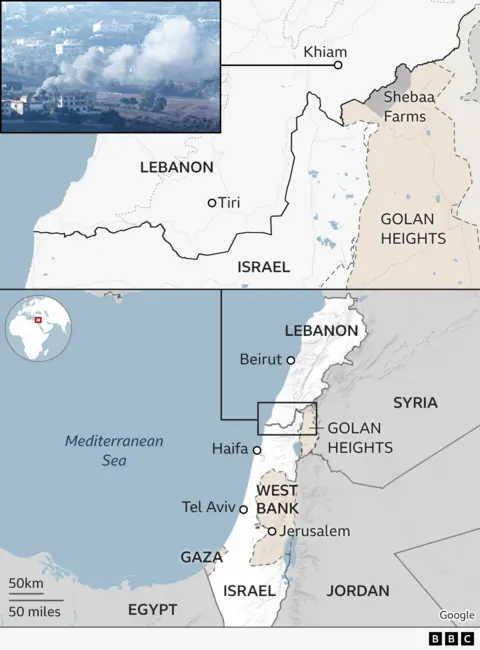Israel and Hezbollah exchange heavy fire in major escalation
Israel has said it carried out a wave of pre-emptive strikes across southern Lebanon to thwart a large-scale rocket and drone attack by Hezbollah.
The Israeli military said fighter jets destroyed thousands of the Iran-backed armed group’s rocket launchers on Sunday morning. Hezbollah and its ally, the Amal movement, said three fighters were killed.
Hezbollah said it still managed to fire 320 rockets and drones at Israel in retaliation for the assassination of a senior commander. Israel’s military said an Israeli navy soldier was killed.
The exchange was a major escalation after 10 months of hostilities that have raised fears of an all-out war.
There have been almost daily exchanges of fire across the Israel-Lebanon border since the day after the start of the war between Israel and Hamas in Gaza on 7 October.
Hezbollah has said it is acting in support of the Palestinian group, which is also backed by Iran. Both Hamas and Hezbollah are proscribed as terrorist organisations by Israel, the UK and other countries.
Since October, more than 560 people have been reported killed by Lebanon’s health ministry, the vast majority of them Hezbollah fighters, while 26 civilians and 23 soldiers have been killed in Israel, according to authorities.
The UN says almost 200,000 people have also been displaced on both sides of the border.
 AFP via Getty Images
AFP via Getty ImagesIsrael’s attack on Hezbollah at around 04:30 (01:30 GMT) on Sunday was its biggest since the full-scale war between them in 2006.
The Israel Defence Forces (IDF) said about 100 fighter jets “struck and destroyed thousands of Hezbollah rocket launcher barrels” in more than 40 areas of southern Lebanon.
Spokesman Rear Admiral Daniel Hagari said it launched the strikes after identifying “extensive preparation” for a large-scale aerial attack by Hezbollah.
Lebanon’s state-run National News Agency reported that Israeli aircraft had struck Beaufort Castle, the Bir Kalb area, and the outskirts of the towns of Ain Qana, Kfar Fila, Louaizeh, Bsalia, Kfar Melki, Sajd, Kfar Fila, and Sarba.
A resident of the town of Zibqeen said it “felt like the apocalypse”.
The Lebanese ministry of public health said one person was killed in a drone strike on a car in Khiam. The Amal movement said one of its fighters from the village was killed.
The ministry also said an Israeli attack on the village of Tiri killed two people. Hezbollah confirmed the deaths of two fighters from nearby Haris, without providing any details.
“What happened today is not the end of the story,” Israeli Prime Minister Benjamin Netanyahu told a cabinet meeting.
“Early this morning, Hezbollah tried to attack the state of Israel with rockets and drones,” he added. “We directed the IDF to carry out an intense pre-emptive attack to remove the threat.”
As well as destroying short-range rockets, Mr Netanyahu said the IDF intercepted all of the drones which Hezbollah had “launched at a strategic target in the centre of the country”.
“[Sheikh Hassan] Nasrallah in Beirut and [Ayatollah Ali] Khamenei in Tehran need to know that this is an additional step in changing the situation in the north,” he warned the leaders of Hezbollah and Iran.
Foreign Minister Israel Katz said he had told dozens of his counterparts worldwide that Israel did “not seek a full-scale war” but would “do whatever it takes to protect our citizens”.
 EVN
EVNNot long after the Israeli strikes, Hezbollah said it targeted and hit 11 Israeli military facilities in Israel and the occupied Golan Heights with more than 320 Katyusha rockets.
It described the barrage as a response to the assassination of senior military commander Fuad Shukr, who was killed in an Israeli strike in Beirut on 30 July.
The group claimed that the operation was “completed and accomplished” and dismissed as “empty” Israel’s statements that its strikes on Sunday had thwarted a larger attack.
Video footage showed explosions in the sky as incoming rockets were intercepted by the Iron Dome air defence system.
Later, the IDF announced that an Israeli Navy soldier “fell during combat in northern Israel”, without providing further details.
Israeli media reported that he was killed in an incident involving a Hezbollah drone and an Iron Dome interceptor in the vicinity of a Dvora patrol boat, about 4km from the Lebanese border.
 EPA
EPAHezbollah leader Hassan Nasrallah said in a televised address on Sunday evening that the group targeted a military intelligence base about 110km (68 miles) into Israeli territory, which was only 1.5km (0.9 miles) away from Tel Aviv.
He claimed Hezbollah was able to carry out its attack as planned, and all drones were launched successfully and entered Israeli airspace, according to a Reuters translation.
He warned that the group will respond again if the results are deemed to be not enough.
Lebanese Prime Minister Najib Mikati – whose government has little influence over Hezbollah – said he was “holding a series of contacts with Lebanon’s friends to stop the escalation”.
He called for a halt to the “Israeli aggression” and the implementation of the UN Security Council resolution which ended the 2006 war.
Mr Mikati also emphasised Lebanon’s support for international efforts to broker a Gaza ceasefire and hostage release deal between Israel and Hamas.
The US sees an agreement as key to de-escalating tensions along the Israel-Lebanon border because Hezbollah has said it will only stop the hostilities once the fighting in Gaza ends.
The director of Mossad and Israel’s Shin Bet domestic security service landed in Egypt on Sunday afternoon to participate in meetings with the CIA director and Qatar’s prime minister.




